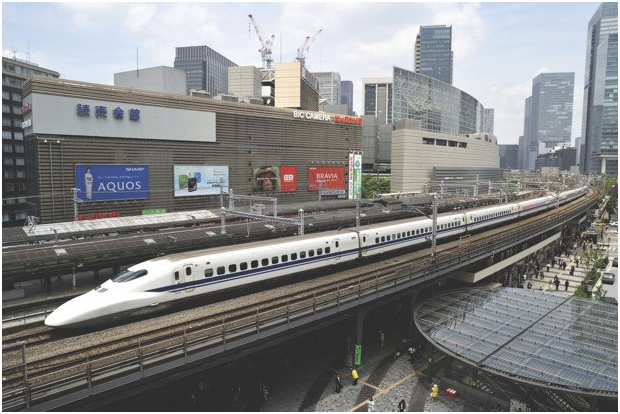Bullet Trains: For Whom and For What?
Japans bullet train

NEW DELHI: India’s decision to start a bullet train with Japan’s technical and economic support promises economic transformation but not many are convinced.
The project, declared in a joint statement between India and Japan will link Mumbai in Maharashtra with Ahmedabad in Gujarat, incurring an estimated cost of about $15bn. The project is expected to start in 2017 and reach completion in six years.
Reportedly, the MOUs signed between the two nations sought to leverage the friendship that morphed partly over a mutual desire to counter China’s growing influence as an economic and military powerhouse.
The news of high-speed bullet train is definitely a euphoric moment for international corporates, local contractors, and a small fraction of aspirational elites aspiring for luxury travel.
In contrast, the decision is a mockery of badly-needed reforms in social infrastructure, health, and education. Already, hope for improvement in sectors such as drinking water, sanitation, women and child development, and other social schemes suffered a hit due to the current Indian government’s decision to reduce spending on these sectors.
Time for a reminder once again that India accommodates a quarter of the world’s undernourished population, over a third of the world’s underweight children, and almost a third of the world’s food-insecure people.
Given India’s poor performance in the health and education sectors, there is a question mark over the feasibility and sagacity of a “showpiece project” at the expense of an overall reduced education and public-health budget.
According to Nobel Laureate Amartya Sen, “Every developing country aspires high and continuous growth. India is the only country in the world which is trying to become a global economic power with an uneducated and unhealthy labor force.”
For those euphoric about the economic benefits promised by bullet trains, it’s about time to assess the cost, ridership privileges, estimated cost of tickets, and the project’s overall viability in propelling India’s economy.
A major chunk of India’s population travel in cheaper, second-class trains. Will the bullet trains bring anything different for these billions of passengers who use India’s crowded and stretched beyond capacity as trail network yearly?
Unlikely, as the fares will be high, and the trains will be beyond the reach of those who need these most. India needs quicker, efficient, hygienic mass-transport system. The priority should have been to make the existing trains travel at higher speeds, and ensure safe and affordable comfort for billions of middle-class Indians.
Sundanda K Datta-Ray wrote in Business Standard, “Modi's loyalty to his home state, Gujarat, is admirable but an Ahmedabad-Mumbai bullet train will not begin to address any of the many problems Indian Railways faces.”
Following a similar line of thought, an Op-Ed article in the Times of India says, “There is nothing intrinsically wrong in a bullet train, but given the priorities outlined in the recent railway budget, there is no case to borrow money to build a showpiece project at this moment in time.”



